Essential Guide to Leadership Development Coaching in 2025
Did you know that 77% of organizations believe their leadership pipeline is not future-ready for 2025? As the business landscape evolves, leadership development coaching is becoming the cornerstone for organizations aiming to thrive amid rapid change.
This essential guide unpacks everything you need to know about leadership development coaching, from the latest trends and proven methodologies to the impact of technology and how to measure true ROI.
You will discover how to navigate the changing expectations for leaders, actionable steps to build resilient teams, and strategies to drive transformation. Ready to future-proof your organization? Start exploring the complete guide, and for more on accountability in leadership, visit Accountability Now.
The Changing Landscape of Leadership Development Coaching in 2025
The landscape of leadership development coaching is undergoing rapid transformation as organizations prepare for 2025. Leaders must navigate new complexities and seize emerging opportunities to stay ahead. Understanding these changes is essential for building resilient, future-ready teams.

Evolving Leadership Challenges and Opportunities
Global markets are more complex than ever, with organizations managing remote and hybrid teams across multiple time zones. Leaders must adapt quickly to shifts in technology, regulations, and culture. This dynamic environment demands agility and emotional intelligence from every leader.
In industries like finance, tech, and healthcare, the pressure to innovate and transform is constant. According to Korn Ferry and Bridgeline, adaptability and innovation top the list of critical leadership skills for 2025. Diversity, equity, and inclusion are no longer optional—they are central to effective leadership.
Today’s leaders are expected to drive transformation, foster inclusive cultures, and respond to disruption at speed. Leadership development coaching is increasingly seen as a strategic lever for these goals.
Shifts in Leadership Competencies and Expectations
The expectations for leadership competencies are shifting fast. Soft skills such as empathy, communication, and resilience are now as important as technical expertise. Leaders must think strategically and make decisions in uncertain, fast-moving contexts.
The rise of Gen Z and millennial employees has accelerated the move toward collaborative, distributed leadership models. These generations value transparency and shared decision-making. Case studies show executive coaching is vital for helping leaders manage crises and digital disruption.
Emotional intelligence and adaptability have become key differentiators, according to Bridgeline. Leadership development coaching helps leaders cultivate these essential qualities.
The Role of Coaching in Addressing Modern Leadership Needs
Leadership development coaching acts as the bridge between personal growth and organizational objectives. It enables tailored development plans for emerging leaders and those transitioning into new roles. Personalized coaching is now used to support diversity, equity, and inclusion, as well as to enhance collaboration and innovation.
Korn Ferry reports that aligning coaching with business strategy can accelerate organizational transformation. Tools like behavioral and 360 assessments allow for highly customized coaching plans that address unique needs.
For example, financial services firms use coaching to help leaders adapt to regulatory changes and manage risk more effectively. This targeted approach ensures leadership development coaching delivers measurable impact.
Data-Driven and Evidence-Based Approaches
Organizations are adopting validated assessment tools, such as Everything DiSC and TriMetrix DNA, to create baselines and measure progress. Defining clear KPIs helps link coaching outcomes directly to business results.
The art of coaching is now blended with science—metrics, profiles, and analytics guide ongoing development. Korn Ferry highlights the importance of tracking progress and integrating coaching into broader talent management strategies.
Many organizations use data to build robust leadership pipelines. By leveraging evidence-based approaches, leadership development coaching becomes more precise and impactful.
The Future of Leadership Coaching: Trends to Watch
Looking ahead, AI-driven coaching platforms are creating personalized learning journeys for leaders at scale. Virtual and hybrid coaching models make it possible to reach global teams with greater flexibility.
Demand is rising for scalable and measurable coaching solutions. Partnerships between coaching firms and tech providers are unlocking new capabilities, such as real-time feedback and progress tracking. Both Bridgeline and Korn Ferry emphasize the need for local expertise combined with global best practices.
For a comprehensive overview of what’s next, explore these Leadership Coaching Trends for 2025, which highlight the importance of ROI, personalization, and emotional intelligence in the evolving world of leadership development coaching. To further enhance your leadership accountability, visit Accountability Now for practical resources.
Core Methodologies and Models in Leadership Development Coaching
Leadership development coaching in 2025 embraces a dynamic blend of methodologies to unlock leaders’ full potential. From individualized executive coaching to data-driven team interventions, organizations now have a robust toolkit for nurturing talent and driving business results. Let’s explore the core models shaping modern leadership development coaching.
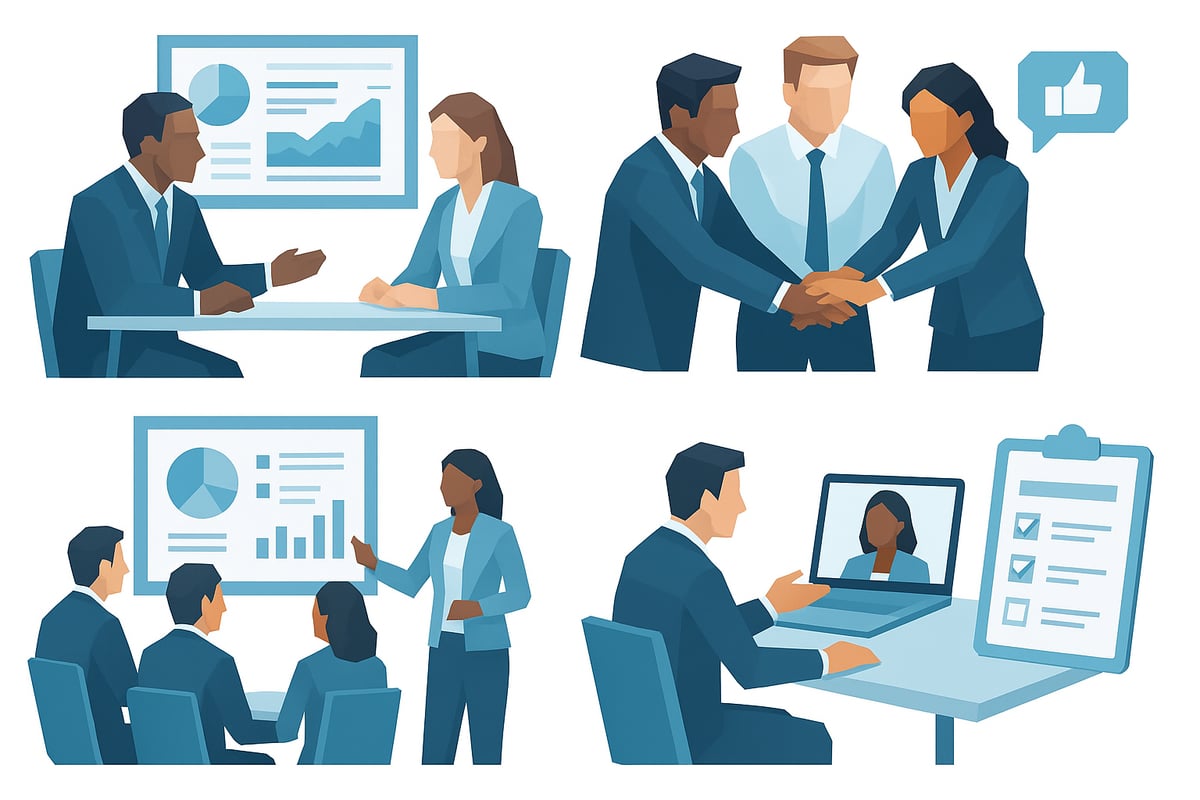
One-on-One Executive Coaching
One-on-one executive coaching remains the gold standard for leadership development coaching at the highest levels. This method pairs senior leaders with seasoned coaches for deeply personalized growth. Sessions focus on strategic alignment, critical decision-making, and self-awareness.
Assessments, such as Everything DiSC® and TriMetrix® DNA, help identify strengths and blind spots, shaping targeted development plans. In tech, executive coaching has empowered founders to scale their leadership as their organizations rapidly grow. For a deeper dive into these approaches, visit Executive coaching for leaders.
Team and Group Coaching Approaches
Team and group coaching are integral to leadership development coaching, especially for organizations navigating complex, cross-functional challenges. Facilitated sessions strengthen communication, collaboration, and shared accountability.
Healthcare organizations, for example, have used team coaching to break down silos and boost patient outcomes. Leading firms like Korn Ferry design team coaching programs to address shared challenges and foster alignment on strategic priorities. These approaches help teams respond to change with agility.
Workshops and Immersive Learning Experiences
Workshops and immersive experiences are vital components of leadership development coaching. They provide safe spaces for leaders to practice adaptability, emotional intelligence, and innovation.
Interactive formats such as scenario planning, role-playing, and vision alignment exercises foster hands-on learning. Fintech companies host innovation workshops, while healthcare sectors prioritize EQ training for their teams. These experiences drive behavioral change and build critical skills for the future.
Behavioral Assessments and 360 Feedback
Modern leadership development coaching leverages validated behavioral assessments and 360 feedback tools to create precise development roadmaps. Popular instruments include:
- EQi2.0 for emotional intelligence
- Everything DiSC® for communication styles
- TriMetrix® DNA for motivators and competencies
- The Five Behaviors® for team dynamics
360 reviews uncover blind spots and provide a holistic view of a leader’s impact. Korn Ferry uses thorough debriefs to launch ongoing development journeys.
Integrative and Hybrid Coaching Models
Integrative and hybrid models are redefining leadership development coaching by combining in-person, virtual, and on-demand elements. These models blend individual and team interventions for maximum impact, offering flexibility and scalability.
Bridgeline’s hybrid coaching programs, for instance, pair offsite facilitation with digital follow-ups, supporting continuous growth. As organizations seek measurable results, leveraging integrative models is essential. For further strategies on building accountability into leadership coaching, visit Accountability Now.
Step-by-Step Guide to Effective Leadership Development Coaching
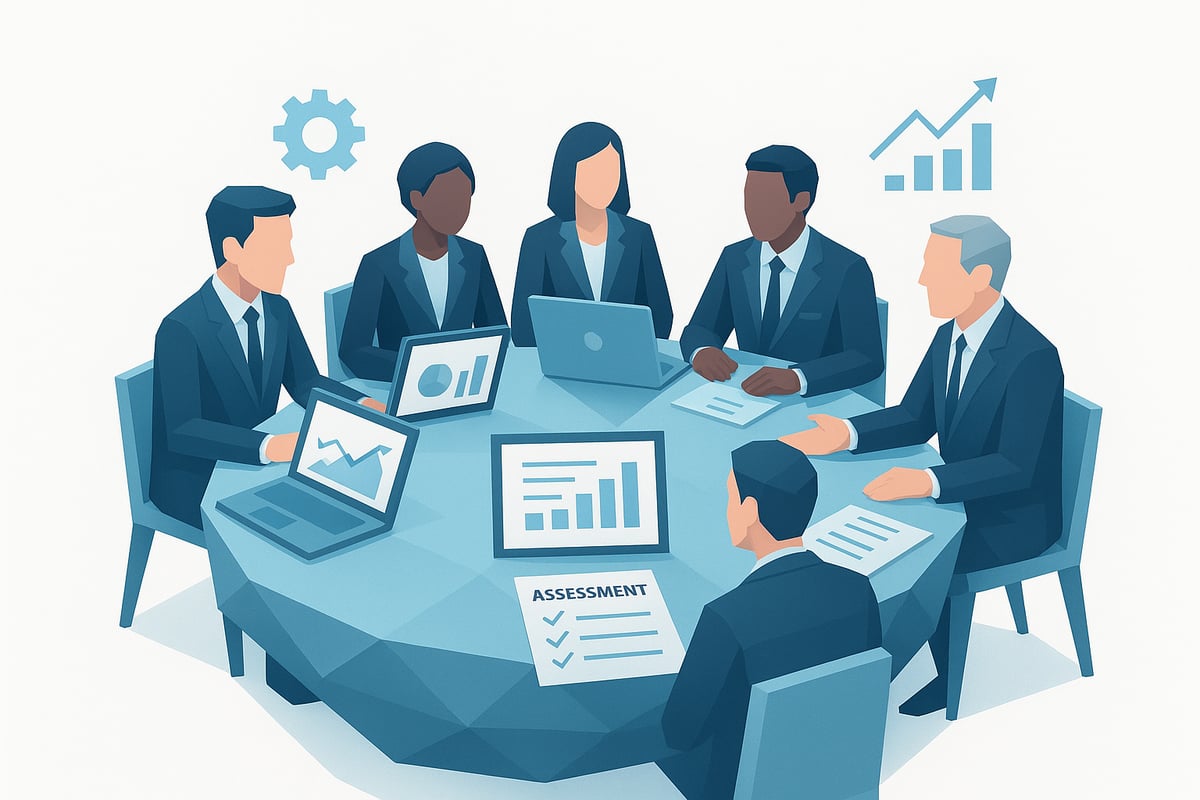
Step 1: Assess Organizational Needs and Leadership Gaps
Every successful leadership development coaching initiative begins with a precise understanding of where your organization stands and where it needs to go. Start by conducting comprehensive diagnostics, including stakeholder interviews and organizational surveys. This uncovers existing leadership strengths, gaps, and future requirements.
Utilize validated assessment tools like Korn Ferry’s success profiles or Bridgeline’s diagnostics for a data-driven baseline. These methods ensure you capture both technical and behavioral competencies, as well as critical cultural factors.
By mapping current capabilities against strategic goals, you set a strong foundation for leadership development coaching that is aligned with business transformation.
Step 2: Define Clear Coaching Objectives and KPIs
Once needs are identified, the next step in leadership development coaching is to set measurable objectives and key performance indicators (KPIs). Align coaching goals with your business strategy and organizational culture to maximize impact.
Involve HR, executives, and coaches in this process to ensure buy-in and relevance. Typical KPIs include employee engagement, retention, leadership competency growth, and business performance metrics.
For proven frameworks and inspiration, explore various leadership coaching strategies that help organizations design outcome-oriented coaching plans. Clear objectives and KPIs drive focus and accountability throughout the coaching journey.
Step 3: Select and Match Coaches to Leaders
The effectiveness of leadership development coaching hinges on the right coach-leader pairing. Define criteria for selection such as sector expertise, coaching credentials, and cultural fit. Many organizations use proprietary algorithms or structured interviews to match coaches with leaders for the best results.
Confidentiality and trust are non-negotiable for productive relationships. Highlight coach profiles and success stories to build confidence among participants.
A thoughtful matching process elevates the quality of leadership development coaching, leading to higher engagement and measurable results.
Step 4: Design Tailored Coaching Plans
With coaches and leaders matched, craft individualized leadership development coaching plans that respond to unique needs. Incorporate insights from assessments, 360 feedback, and organizational priorities.
Plans should blend one-on-one sessions, team workshops, digital tools, and ongoing feedback loops. Address specific challenges, such as toxic behaviors, skill gaps, or low engagement, with targeted interventions.
Case examples from tech and finance show how customized plans accelerate leadership growth and support business objectives. Tailored plans ensure that coaching is relevant and impactful at every level.
Step 5: Deliver Coaching Interventions and Monitor Progress
Implement coaching interventions through regular sessions, which may be in-person, virtual, or hybrid. Leverage technology to schedule meetings, share resources, and track progress in real time.
Continuous feedback is essential. Encourage reflection after each session, and use digital platforms to collect insights and measure outcomes. Adjust plans as needed to address emerging challenges or opportunities.
Organizations like Korn Ferry emphasize ongoing progress tracking and ROI measurement, reinforcing the value of leadership development coaching as a catalyst for transformation.
Step 6: Evaluate Impact and Scale Success
The final step in leadership development coaching is evaluation and scaling. Measure outcomes using defined KPIs, behavioral indicators, and cultural metrics. Gather feedback from participants and stakeholders to identify what worked and where improvements are needed.
Successful models can be scaled across teams and departments for broader organizational impact. For guidance on effective evaluation and building accountability into your coaching program, visit Accountability Now.
A rigorous evaluation process ensures continuous improvement and maximizes the return on your leadership development coaching investment.
How Technology is Transforming Leadership Coaching in 2025
Technology is fundamentally reshaping leadership development coaching, making it more personalized, accessible, and data-driven than ever before. In 2025, organizations are leveraging cutting-edge digital tools to empower leaders at every level, ensuring they can adapt and thrive in a rapidly evolving business environment.
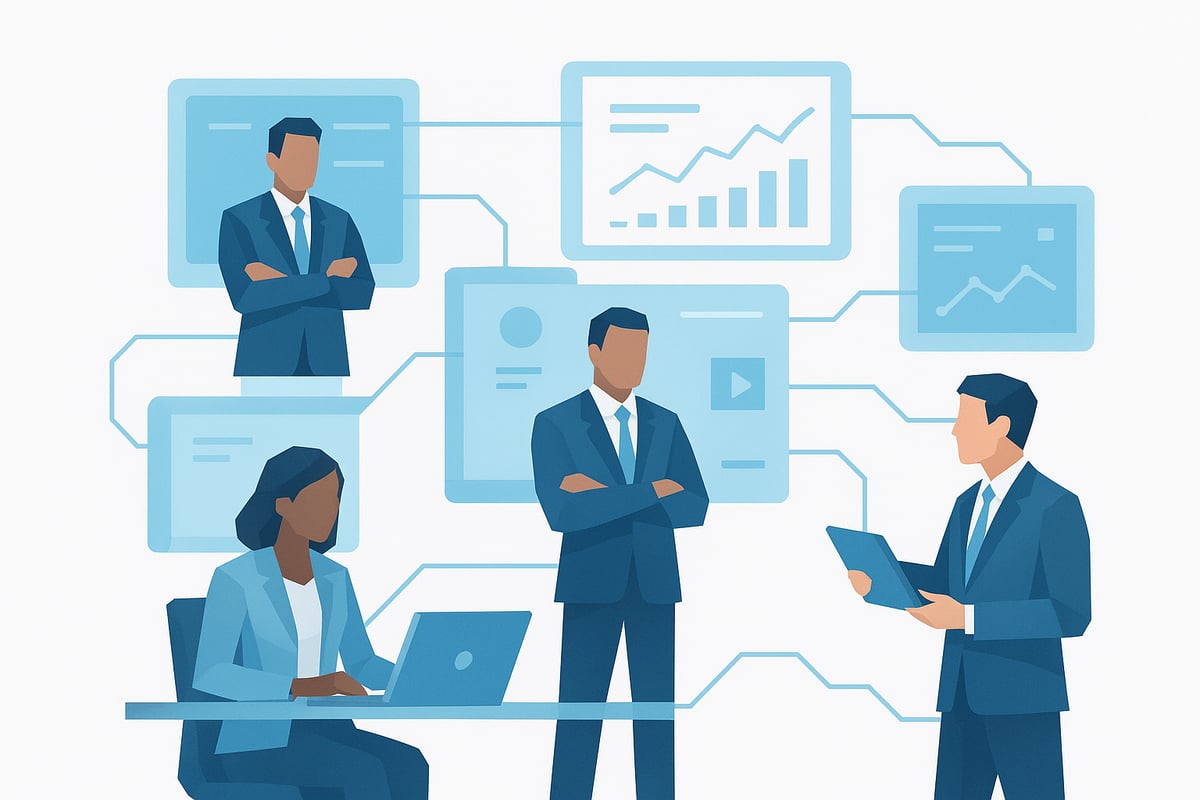
AI and Data Analytics in Coaching
Artificial intelligence is revolutionizing how organizations approach leadership development coaching. AI-powered platforms deliver personalized coaching journeys, adapting content and pace to each leader’s unique needs. Predictive analytics help organizations identify leadership potential and flag risk areas before they escalate.
Automated progress tracking and real-time feedback loops ensure leaders receive timely, actionable insights. For example, advanced platforms now integrate behavioral data, engagement scores, and coaching outcomes to fine-tune development strategies. For a deeper dive on trends like AI-driven coaching and digital transformation, see Leadership Training Trends Organizations Need in 2025.
Virtual and Hybrid Coaching Delivery
The shift to remote and hybrid workforces has accelerated the adoption of virtual coaching. Leadership development coaching is now delivered via secure video sessions, digital collaboration tools, and interactive online modules, providing flexibility for busy executives and global teams.
This approach breaks down geographical barriers, making expert coaching accessible to organizations of all sizes. Hybrid models combine the depth of in-person interactions with the convenience of digital platforms, supporting ongoing engagement and accountability. Leaders can participate in group workshops, peer sessions, and one-on-one coaching, all within a unified virtual environment.
Digital Assessment Tools and Dashboards
Digital assessment tools are at the core of modern leadership development coaching. Real-time dashboards give leaders and HR professionals instant access to development metrics, progress reports, and feedback summaries.
Key features include:
- Integration with HR and talent management systems for seamless data flow
- Customizable dashboards tailored to organizational priorities
- Automated reminders and milestone tracking for continuous improvement
Platforms like Everything DiSC® and TriMetrix® DNA offer digital assessments that help uncover strengths and target growth areas, ensuring coaching is evidence-based and results-focused.
The Future: Scalable and Measurable Coaching Solutions
Looking ahead, technology will continue to drive scalability and measurable impact in leadership development coaching. Platforms are emerging that support thousands of leaders simultaneously, offering tailored modules for various industries and leadership tiers.
Strategic partnerships between coaching firms and tech providers are enhancing capabilities, making it easier to demonstrate ROI and adapt programs quickly. As organizations demand more transparency and accountability, leveraging digital solutions will be critical. For guidance on building accountability into leadership coaching initiatives, visit Accountability Now.
Measuring ROI and Impact of Leadership Development Coaching
Measuring the ROI and impact of leadership development coaching is essential for organizations aiming to validate investments and drive continuous improvement. In 2025, leaders expect concrete results, not just anecdotal success stories. By using clear metrics, data-driven tools, and real-world examples, organizations can demonstrate the true value of coaching programs.
Key Metrics for Success
The effectiveness of leadership development coaching hinges on tracking the right metrics. Common KPIs include employee engagement, leadership competency growth, retention rates, and business performance improvements. Behavioral change indicators, such as increased adaptability and better communication, are also critical.
Organizations often set clear benchmarks before coaching begins. These may include improvement in 360 feedback scores, reduction in turnover, or progress in succession planning. Korn Ferry research highlights that linking coaching outcomes directly to business results increases buy-in and demonstrates tangible value.
Tools and Frameworks for Evaluation
A robust evaluation process combines quantitative and qualitative data. Pre- and post-coaching assessments, 360 feedback, and pulse surveys help measure shifts in leadership behavior. Digital dashboards now enable real-time tracking of progress and ROI.
Evidence-based tools like Everything DiSC® and TriMetrix® DNA offer validated insights into leadership styles and motivators. For organizations seeking to strengthen team alignment, exploring Building team alignment can provide actionable frameworks and examples.
Case Studies: Demonstrating Tangible Results
Industry-specific case studies highlight the impact of leadership development coaching. In financial services, coaching has helped leaders navigate crisis management and regulatory changes with measurable improvements in compliance and decision-making. Healthcare organizations have reported better collaboration, higher patient satisfaction, and increased innovation after implementing team coaching.
Manufacturing companies, for instance, have leveraged leadership coaching in manufacturing to drive operational excellence, improve safety records, and foster a culture of continuous improvement. These examples underscore the adaptability and measurable benefits of coaching across sectors.
Overcoming Common Measurement Challenges
Isolating the true impact of leadership development coaching can be complex. Organizations must distinguish coaching outcomes from other parallel initiatives, such as new technology rollouts or restructuring. Gaining stakeholder buy-in for measurement is crucial, as is ensuring confidentiality and data integrity.
Continuous improvement relies on gathering feedback, adjusting KPIs, and using data to refine coaching approaches. For organizations seeking best practices in accountability and measurement, resources like Accountability Now offer valuable guidance for maximizing coaching ROI and sustaining transformation.
Implementing Leadership Coaching Programs: Best Practices and Actionable Strategies
Implementing a successful leadership development coaching program requires more than just hiring coaches. It demands a strategic, organization-wide approach that fosters a culture of growth, accountability, and measurable impact.
Building a Coaching Culture Across the Organization
Embedding leadership development coaching into your organization’s DNA starts at the top. Leaders must champion coaching, model open feedback, and encourage continuous learning.
A coaching culture thrives when organizations:
- Integrate coaching into onboarding, performance, and talent development frameworks
- Recognize and reward coaching behaviors at all levels
- Provide access to coaching resources for emerging and senior leaders
- Foster psychological safety for honest conversations
When leadership development coaching is woven into daily operations, employees feel empowered to take ownership of their growth. This approach breaks down silos and accelerates organizational change, making coaching an engine for sustainable success.
Aligning Coaching with Organizational Strategy
For maximum impact, leadership development coaching must be tied directly to your strategic goals. This means aligning coaching objectives with business transformation initiatives, compliance requirements, and cultural values.
HR plays a vital role in ensuring coaching becomes part of succession planning and leadership pipeline development. By setting clear KPIs that reflect business priorities, you can track progress and demonstrate ROI.
Looking to the future, organizations that connect coaching with strategy are better positioned to adapt to change and foster innovation. For additional insights into upcoming trends, see Leadership Development Trends You Can’t Ignore.
Selecting the Right Coaching Partner
Choosing the right partner for leadership development coaching is crucial. Evaluate providers based on:
- Proven expertise in your industry or sector
- Scalability to support leaders at every level
- Evidence-based methodologies and measurable results
- Strong client testimonials and case studies
Local expertise with global reach can help tailor programs to your unique needs. A trusted partner will offer customized solutions, robust coach matching, and transparent reporting. This ensures every coaching engagement aligns with your organizational values and delivers long-term impact.
Noomii Corporate Leadership Program: Precision and Measurable Results
The Noomii Corporate Leadership Program stands out for its tailored approach to leadership development coaching. Noomii addresses complex challenges such as toxic leadership patterns, executive decision-making, and compliance with advanced diagnostics and precision coach matching.
Organizations benefit from:
- Scalable impact tracking and measurable ROI
- Solutions that fit government, Fortune 500, and mid-sized firms
- Evidence-based coaching aligned with cultural and strategic needs
By empowering organizations to transform leadership at every level, Noomii ensures your investment in coaching delivers lasting results and supports your mission.
Action Steps for Launching a Successful Coaching Program
To launch a high-impact leadership development coaching initiative, follow these steps:
- Begin with leadership assessments and stakeholder alignment sessions.
- Define clear objectives, KPIs, and timelines for measuring progress.
- Pilot the program with a select group, gather feedback, and refine your approach.
- Scale gradually, using digital tools for efficiency and consistency.
- Encourage accountability and track progress at every stage.
For a deeper dive into how accountability drives coaching outcomes, visit Accountability Now. With a structured plan and the right partners, your organization can unlock the full potential of leadership development coaching.
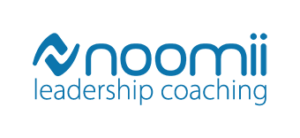
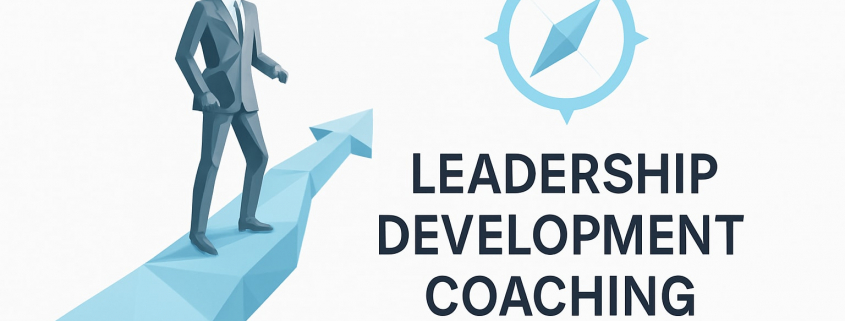


Leave a Reply
Want to join the discussion?Feel free to contribute!